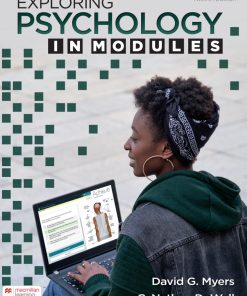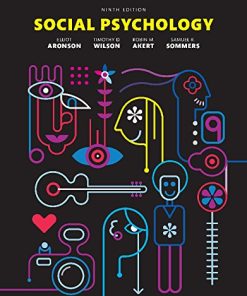(Ebook PDF) Exploring Social Psychology 9th Edition by David Myers 1260807509 9781260807509 full chapters
$50.00 Original price was: $50.00.$25.00Current price is: $25.00.
Exploring Social Psychology 9th Edition by David Myers – Ebook PDF Instant Download/DeliveryISBN: 1260807509, 9781260807509
Full download Exploring Social Psychology 9th Edition after payment.

Product details:
ISBN-10 : 1260807509
ISBN-13 : 9781260807509
Author : David Myers
Exploring Social Psychology succinctly explores social psychological science and applies it to contemporary issues and everyday life. Based on the bestselling text, Social Psychology by David Myers and Jean Twenge, the book presents 31 short modules that introduce students to such scientific explorations as love and hate, conformity and independence, prejudice and helping, and persuasion and self-determination. Exploring Social Psychology represents social psychology’s scope and highlights its scientific study of how we think about, influence, and relate to one another.The 9th edition includes Connect and SmartBook, the adaptive reading and study experience which guides students to master, recall, and apply key concepts while providing automatically-graded assessments.
Exploring Social Psychology 9th Table of contents:
PART ONE: Introducing Social Psychology
MODULE 1 Doing Social Psychology
Forming and Testing Theories
Correlational Research: Detecting Natural Associations
Correlation and Causation
Experimental Research: Searching for Cause and Effect
Random Assignment: The Great Equalizer
Control: Manipulating Variables
The Ethics of Experimentation
Generalizing from Laboratory to Life
MODULE 2 Did You Know It All Along?
PART TWO: Social Thinking
MODULE 3 Self-Concept: Who Am I?
At the Center of Our Worlds: Our Sense of Self
Self and Culture
Growing Individualism Within Cultures
Culture and Self-Esteem
Self-Knowledge
Predicting Our Behavior
Predicting Our Feelings
The Wisdom and Illusions of Self-Analysis
MODULE 4 Self-Serving Bias
Explaining Positive and Negative Events
Can We All Be Better Than Average?
Unrealistic Optimism
False Consensus and Uniqueness
Self-Esteem Motivation
MODULE 5 Narcissism and the Limits of Self-Esteem
The Trade-off of Low Versus High Self-Esteem
Narcissism: Self-Esteem’s Conceited Sister
Self-Efficacy
MODULE 6 The Fundamental Attribution Error
The Fundamental Attribution Error in Everyday Life
Why Do We Make the Attribution Error?
Perspective and Situational Awareness
Cultural Differences
How Fundamental is the Fundamental Attribution Error?
MODULE 7 The Powers and Perils of Intuition
The Powers of Intuition
The Limits of Intuition
We Overestimate the Accuracy of Our Judgments
Remedies for Overconfidence
Constructing Memories of Ourselves and Our Worlds
Reconstructing Our Past Attitudes
Reconstructing Our Past Behavior
MODULE 8 Reasons for Unreason
Our Preconceptions Control Our Interpretations
We Are More Swayed By Memorable Events Than Facts
We Misperceive Correlation and Control
Illusory Correlation
Our Beliefs Can Generate Their Own Confirmation
Do Teacher Expectations Affect Student Performance?
Do We Get from Others What We Expect?
Conclusions
MODULE 9 Behavior and Belief
Do Attitudes Influence Behavior?
Does Behavior Influence Attitudes?
Role Playing
Saying Becomes Believing
Evil Acts and Attitudes
Interracial Interaction and Racial Attitudes
Brainwashing
Why Does Our Behavior Affect Our Attitudes?
MODULE 10 Clinical Intuition
Illusory Correlations
Hindsight
Self-Confirming Diagnoses
Clinical Intuition Versus Statistical Prediction
Implications for Better Clinical Practice
MODULE 11 Clinical Therapy: The Powers of Social Cognition
Social Cognition and Depression
Distortion or Realism?
Is Negative Thinking a Cause or a Result of Depression?
Social Cognition and Loneliness
Social Cognition and Anxiety
Social-Psychological Approaches to Treatment
Inducing Internal Change Through External Behavior
Breaking Vicious Cycles
PART THREE: Social InfluenceSocial Influence
MODULE 12 Biology and Culture
Evolution and Behavior
Biology and Gender
Gender and Hormones
Reflections on Evolutionary Psychology
Culture and Behavior
Cultural Diversity
Cultural Similarity
Culture and Gender
MODULE 13 Gender Similarities and Differences
How Are Females and Males Alike and Different?
Independence Versus Connectedness
Social Dominance
Aggression
Sexuality
What Can We Conclude About Biology, Culture, and Gender?
MODULE 14 How Nice People Get Corrupted
Asch’s Studies of Conformity
Milgram’s Obedience Studies
What Breeds Obedience?
Institutional Authority
Reflections on the Classic Studies
Behavior and Attitudes
The Power of Social Norms
MODULE 15 Two Routes to Persuasion
The Two Routes
The Elements of Persuasion
Who Says? The Communicator
What Is Said? The Message Content
Message Context
To Whom Is It Said? The Audience
The Two Routes to Persuasion in Therapy
MODULE 16 Indoctrination and Inoculation
Resisting Persuasion: Attitude Inoculation
Attitude Inoculation
Implications of Attitude Inoculation
MODULE 17 Social Facilitation: The Mere Presence of Others
The Mere Presence of Others
Crowding: The Presence of Many Others
Why Are We Aroused in the Presence of Others?
Evaluation Apprehension
Driven by Distraction
Mere Presence
MODULE 18 Social Loafing: Many Hands Make Diminished Responsibility
Many Hands Make Light Work
Social Loafing in Everyday Life
MODULE 19 Deindividuation: Doing Together What We Would Not Do Alone
Deindividuation
Group Size
Anonymity
Arousing and Distracting Activities
Diminished Self-Awareness
MODULE 20 How Do Groups Intensify Decisions?
The Case of the “Risky Shift”
Do Groups Intensify Opinions?
Group Polarization Experiments
Group Polarization in Everyday Life
Explaining Group Polarization
Informational Influence
Normative Influence
Groupthink
Symptoms of Groupthink
Groupthink in Action
Preventing Groupthink
MODULE 21 Power to the Person
Resisting Social Pressure
Reactance
Asserting Uniqueness
Minority Influence
Consistency
Self-Confidence
Defections from the Majority
Is Leadership Minority Influence?
PART FOUR: Social Relations
MODULE 22 The Reach of Prejudice
What Is Prejudice?
Prejudice: Implicit and Explicit
Racial Prejudice
Gender Prejudice
LGBT Prejudice
MODULE 23 The Roots of Prejudice
Social Sources of Prejudice
Socialization
Motivational Sources of Prejudice
Frustration and Aggression: The Scapegoat Theory
Social Identity Theory: Feeling Superior to Others
Cognitive Sources of Prejudice
Categorization: Classifying People into Groups
Distinctiveness: Perceiving People Who Stand Out
Attribution: Is It a Just World?
The Consequences of Prejudice
Self-Perpetuating Prejudgments
Discrimination’s Impact: The Self-Fulfilling Prophecy
Stereotype Threat
MODULE 24 The Nature and Nurture of Aggression
Theories of Aggression
Is Aggression an Instinct?
Neural Influences
Genetic Influences
Blood Chemistry
Psychological Influences on Aggression
Frustration and Aggression
The Learning of Aggression
Environmental Influences on Aggression
Painful Incidents
Heat
Attacks
Crowding
Reducing Aggression
Catharsis?
A Social Learning Approach
Culture Change and World Violence
MODULE 25 Does Media Use Influence Social Behavior?
Pornography and Sexual Violence
Distorted Perceptions of Sexual Reality
Aggression Against Women
Television, Movies, and the Internet
Media’s Effects on Behavior
Another Media Influence: Video Games
MODULE 26 Who Likes Whom?
Proximity
Interaction
Anticipation of Interaction
Mere Exposure
Physical Attractiveness
Attractiveness and Dating
The Matching Phenomenon
The Physical-Attractiveness Stereotype
Who Is Attractive?
Similarity Versus Complementarity
Do Birds of a Feather Flock Together?
Do Opposites Attract?
Liking Those Who Like Us
Our Need to Belong
How Important is the Need to Belong?
MODULE 27 The Ups and Downs of Love
Passionate Love
A Theory of Passionate Love
Variations in Love: Culture and Gender
Companionate Love
Maintaining Close Relationships
Equity
Self-Disclosure
Ending Relationships
Who Divorces?
The Detachment Process
MODULE 28 Causes of Conflict
Social Dilemmas
The Prisoner’s Dilemma
The Tragedy of the Commons
Resolving Social Dilemmas
Competition
Perceived Injustice
Misperception
Mirror-Image Perceptions
Shifting Perceptions
MODULE 29 Blessed Are the Peacemakers
Contact
Does Contact Predict Attitudes?
Does Desegregation Improve Racial Attitudes?
When Does Desegregation Improve Racial Attitudes?
Cooperation
Common External Threats Build Cohesiveness
Superordinate Goals Foster Cooperation
Cooperative Learning Improves Racial Attitudes
Communication
Bargaining
Mediation
Arbitration
Conciliation
MODULE 30 When Do People Help?
Why Do People Help?
When Do People Help?
Number of Bystanders
Noticing
Interpreting
Assuming Responsibility
MODULE 31 Social Psychology and the Sustainable Future
Psychology and Climate Change
Psychological Effects of Climate Change
Public Opinion About Climate Change
Enabling Sustainable Living
New Technologies
Reducing Consumption
The Social Psychology of Materialism and Wealth
Increased Materialism
Wealth and Well-Being
Materialism Fails to Satisfy
Toward Sustainability and Survival
People also search for Exploring Social Psychology 9th:
exploring social psychology 9th edition
exploring social psychology pdf
exploring social psychology 9th ed myers & twenge
exploring social psychology 9th edition online
exploring social psychology 9th ed
Tags:
Exploring,Social Psychology,David Myers
You may also like…
History & Research
History & Research
Uncategorized
Uncategorized
History & Research
History & Research
History & Research
History & Research
Social Psychology 12th Edition by David Myers, Jean Twenge 0077861973 978-0077861971











